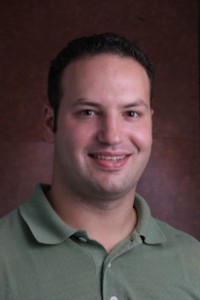
Virginia Tech honors an alumnus at ASU
Posted: May 17, 2010
Arizona State University assistant professor Henry Sodano is this year’s Outstanding Young Alumnus from Virginia Tech’s College of Engineering.

Henry Sodano
Sodano teaches in the School of Mechanical, Aerospace, Chemical and Materials Engineering, a part of ASU’s Ira A. Fulton Schools of Engineering. He earned a bachelor’s degree in 2002, masters in 2003 and a doctoral degree in 2005 in mechanical engineering at Virginia Tech.
It was there that Sodano began research into “energy harvesting” that he continues at ASU.
It involves culling energy from environmental sources such as light, temperature gradients, wind and vibrations. For instance, while jogging, runners can power digital music players, cell phones or other small devices through an energy-emitting sensor strapped to their legs or a backpacks that produces electricity.
Another project involves bridge-safety monitors powered by the vibrations of the bridge itself, as cars and other vehicles pass over it.
Such work helped Sodano earn the NASA Graduate Student Research Program Fellowship at Virginia Tech, as well as a post-doctoral fellowship at Los Alamos National Laboratories, and a place in the U.S. Air Force Research Laboratory’s Air Vehicles Directorate Summer Faculty Program.
Sodano joined the faculty at ASU in 2007, after a stint at Michigan Technological University.
He has published roughly 90 technical articles since 2002 (five book chapters, 38 refereed journals and 43 conference proceedings) and serves as an associate editor of two archival journals: Smart Materials and Structures and the Journal of Intelligent Material Systems and Structures.
In 2009 he earned the National Science Foundation’s CAREER award, an honor given to creative junior faculty considered likely to become education and research leaders in their fields. The same year he was awarded ASU’s Faculty Achievement Award for Defining Edge Research.
Sodano’s success is due in large part to the inventive approach he brings to his research that is pushing the boundaries of mechanical engineering, said Kyle Squires, director of the School of Mechanical, Aerospace, Chemical and Materials Engineering.
“He’s addressing important questions at the interface of structures, experimental mechanics and functional materials,” Squires said. “He has been successful in using a combination of materials synthesis techniques, measurements and modeling to advance research in smart materials and structures, in turn addressing important applications in areas that include sensors, composites, controls, vibrations and energy harvesting.”
Some of that recent research involves the development of lighter and stronger composite materials – an advance that, for instance, will help improve medical technologies such as prosthetic devices and biological implants.



































